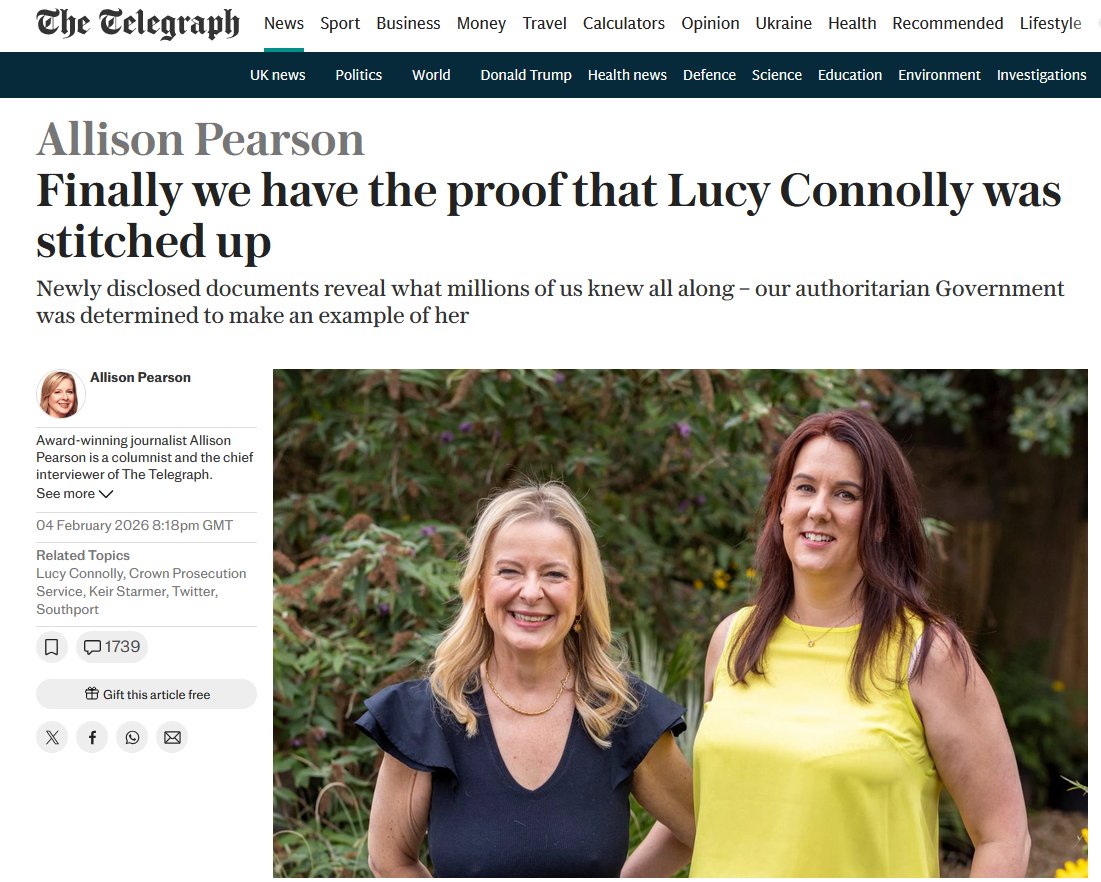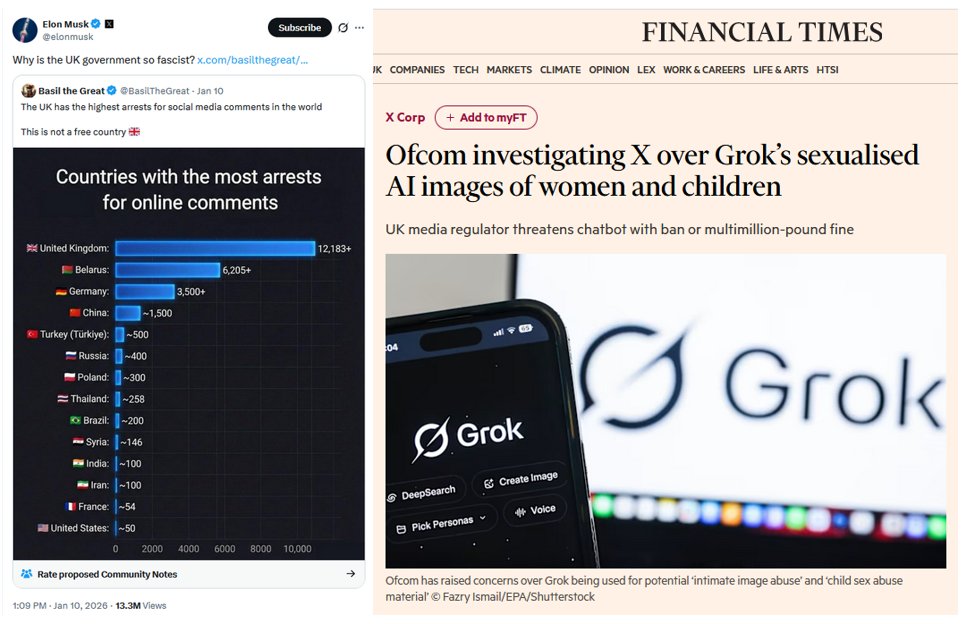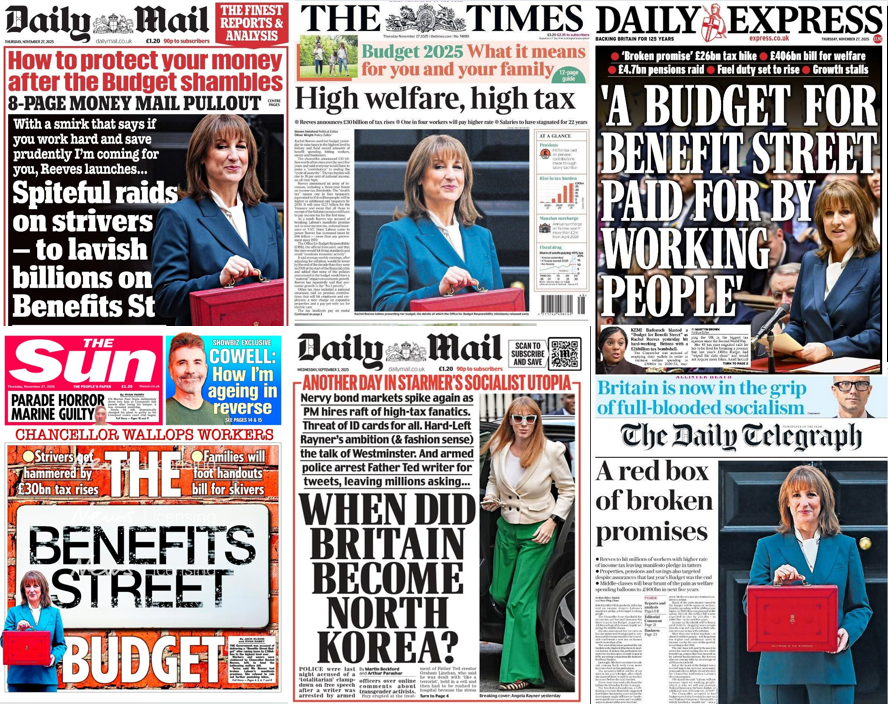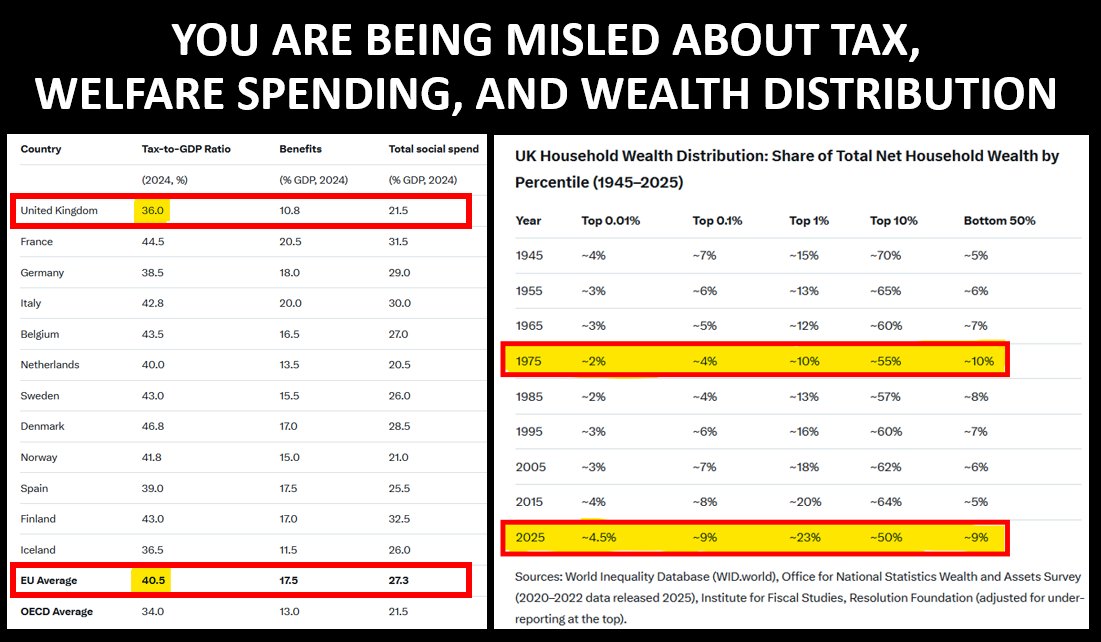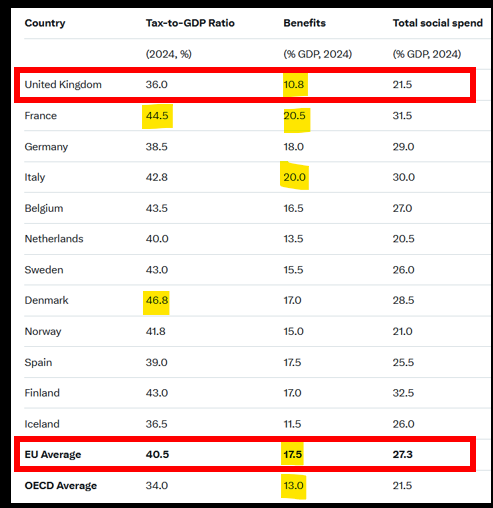You might have seen the Tory manifesto - sorry, Laurence W. Britt’s “14 Defining Characteristics of Fascism” circulating online.
The first version was published in an article titled “Fascism, Anyone?” in the Spring, 2003 issue of Free Inquiry, a secular humanist magazine.
The first version was published in an article titled “Fascism, Anyone?” in the Spring, 2003 issue of Free Inquiry, a secular humanist magazine.
Since then, many altered versions have been in circulation.
This article looks at the lists evolution, especially the version circulated on a website run by Jeff Rense, a right-wing talk radio host.
danielmalmer.medium.com/the-long-compl…
This article looks at the lists evolution, especially the version circulated on a website run by Jeff Rense, a right-wing talk radio host.
danielmalmer.medium.com/the-long-compl…
Jeff Rinse is accused of promoting antisemitism, & has given a platform to a number of racist extremists like David Duke. His website is teeming with conspiracy theories, & his show has hosted conspiracy theorists like Alex Jones & David Icke.
Anyway, let's explore the original.
Anyway, let's explore the original.
Humanist magazine 'Free Inquiry' describes Laurence Britt as “a retired international businessperson, writer, & commentator", & the article as “the most reprinted — & most pirated — article in the magazine’s history.”
secularhumanism.org/2003/03/fascis…
secularhumanism.org/2003/03/fascis…
Many people are concerned that in the USA, across Europe, & now in the UK, the principles of fascism are once again ascendant, & uncanny parallels exist between several modern Governments - including ours - & 'classic' fascist regimes.
Fascism is a political ideology & mass movement that dominated many parts of central, southern, & eastern Europe between 1919 & 1945 & that also had adherents in western Europe, the USA, South Africa, Japan, Latin America, & the Middle East.
britannica.com/topic/fascism
britannica.com/topic/fascism
Although fascist parties & movements differed significantly from one another, they had many characteristics in common. Before getting to Laurence W. Britt’s “14 Defining Characteristics of Fascism”, I'll quickly list a few of the more obvious ones:
Militaristic nationalism
Contempt for electoral democracy & political/cultural liberalism
Belief in natural social hierarchy & the rule of elites
Creation of a Volksgemeinschaft (“people’s community”), in which individual interests would be subordinated to the good of the nation.
Contempt for electoral democracy & political/cultural liberalism
Belief in natural social hierarchy & the rule of elites
Creation of a Volksgemeinschaft (“people’s community”), in which individual interests would be subordinated to the good of the nation.
At the end of WWII, the major European fascist parties were broken up, & in some countries (eg Italy & West Germany) they were officially banned.
But beginning in the late 1940s, many fascist-oriented parties & movements were founded in Europe, Latin America & South Africa.
But beginning in the late 1940s, many fascist-oriented parties & movements were founded in Europe, Latin America & South Africa.
Most people who were adults during WWII are now dead: we're two-and-a-half generations removed from the horrors of Nazi Germany, although constant reminders jog our conscience.
German & Italian fascism form the historical models that define this grotesque political worldview.
German & Italian fascism form the historical models that define this grotesque political worldview.

The fascist worldview & characteristics of endure. Nazi Germany, Fascist Italy, Franco’s Spain, Salazar’s Portugal, Papa dopoulos’s Greece, Pinochet’s Chile, & Suharto’s Indonesia all followed the fascist or proto/neo-fascist model in obtaining, expanding, & maintaining power. 

Analysis of these seven regimes reveals fourteen common threads that link them in recognisable patterns of national behavior & abuse of power.
These basic characteristics are more prevalent/intense in some regimes than in others, but they all share some level of similarity.
These basic characteristics are more prevalent/intense in some regimes than in others, but they all share some level of similarity.
I'm NOT commenting upon whether or not we can objectively suggest that Britain's current Govt might be considered proto/neo-fascist, rather, I'm simply outlining the characteristics uncovered by Laurence W Britt's 2003 analysis, which I quote in full.
Draw your own conclusions.
Draw your own conclusions.
1 Powerful & continuing expressions of nationalism.
From the prominent displays of flags & bunting to the ubiquitous lapel pins, the fervor to show patriotic nationalism, both on the part of the regime itself & of citizens caught up in its frenzy, was always obvious.

From the prominent displays of flags & bunting to the ubiquitous lapel pins, the fervor to show patriotic nationalism, both on the part of the regime itself & of citizens caught up in its frenzy, was always obvious.


Catchy slogans, pride in the military, & demands for unity were common themes in expressing this nationalism.
It was usually coupled with a suspicion of things foreign that often bordered on xenophobia.


It was usually coupled with a suspicion of things foreign that often bordered on xenophobia.



2 Disdain for the importance of human rights.
The regimes themselves viewed human rights as of little value & a hindrance to realizing the objectives of the ruling elite.


The regimes themselves viewed human rights as of little value & a hindrance to realizing the objectives of the ruling elite.



Through clever use of propaganda, the population was brought to accept these human rights abuses by marginalizing, even demonizing, those being targeted.
When abuse was egregious, the tactic was to use secrecy, denial, & disinformation.

When abuse was egregious, the tactic was to use secrecy, denial, & disinformation.


3 Identification of enemies/scapegoats as a unifying cause: the most significant common thread among these regimes was the use of scapegoating as a means to divert people’s attention from other problems, to shift blame for failures, & channel frustration in controlled directions. 







Relentless propaganda & disinformation were effective; regimes would incite “spontaneous” acts against the target scapegoats, usually Marxists, socialists, liberals, Jews, ethnic minorities, traditional national enemies, other religions, secularists, gay people, & “terrorists.” 





Active opponents of these regimes were inevitably labeled as (domestic) terrorists, & dealt with accordingly.
4 The supremacy of the military/avid militarism.
Ruling elites always identified closely with the military & the industrial infrastructure that supported it.


4 The supremacy of the military/avid militarism.
Ruling elites always identified closely with the military & the industrial infrastructure that supported it.



A disproportionate share of national resources was allocated to the military, even when domestic needs were acute. The military was seen as an expression of nationalism, & used to assert national goals, intimidate other nations & increase the power & prestige of the ruling elite. 



5 Rampant sexism.
Regimes viewed women as second-class citizens. They were adamantly anti-abortion & homophobic. These attitudes were often codified in Draconian laws that enjoyed support by the orthodox religion of the country, thus lending the regime cover for its abuses.



Regimes viewed women as second-class citizens. They were adamantly anti-abortion & homophobic. These attitudes were often codified in Draconian laws that enjoyed support by the orthodox religion of the country, thus lending the regime cover for its abuses.




6 A controlled mass media.
Under some of the regimes, the mass media were under strict direct control and could be relied upon never to stray from the party line. Other regimes exercised more subtle power to ensure media orthodoxy.


Under some of the regimes, the mass media were under strict direct control and could be relied upon never to stray from the party line. Other regimes exercised more subtle power to ensure media orthodoxy.



Methods included the control of licensing & access to resources, economic pressure, appeals to patriotism, & implied threats.
The leaders of the mass media were often politically compatible with the power elite. This kept the general public unaware of the regimes’ excesses.


The leaders of the mass media were often politically compatible with the power elite. This kept the general public unaware of the regimes’ excesses.



7. Obsession with national security.
Under direct control of the ruling elite, it was usually an instrument of oppression, operating in secret & beyond any constraints. Questioning its activities was portrayed as unpatriotic or even treasonous.


Under direct control of the ruling elite, it was usually an instrument of oppression, operating in secret & beyond any constraints. Questioning its activities was portrayed as unpatriotic or even treasonous.



8. Religion and ruling elite tied together.
Fascist & protofascist regimes were never proclaimed godless by their opponents. Most of the regimes attached themselves to the predominant religion of the country & chose to portray themselves as militant defenders of that religion.


Fascist & protofascist regimes were never proclaimed godless by their opponents. Most of the regimes attached themselves to the predominant religion of the country & chose to portray themselves as militant defenders of that religion.

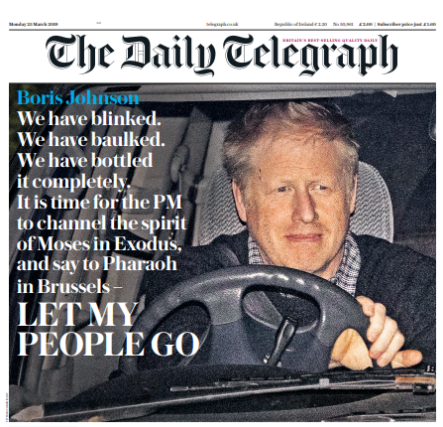

The fact that the ruling elite’s behavior was incompatible with the precepts of the religion was generally swept under the rug. Propaganda kept up the illusion that the ruling elites were defenders of the faith & opponents of the “godless.” 





9. Power of corporations protected.
Although the personal life of ordinary citizens was under strict control, the ability of large corporations to operate in relative freedom was not compromised.

Although the personal life of ordinary citizens was under strict control, the ability of large corporations to operate in relative freedom was not compromised.
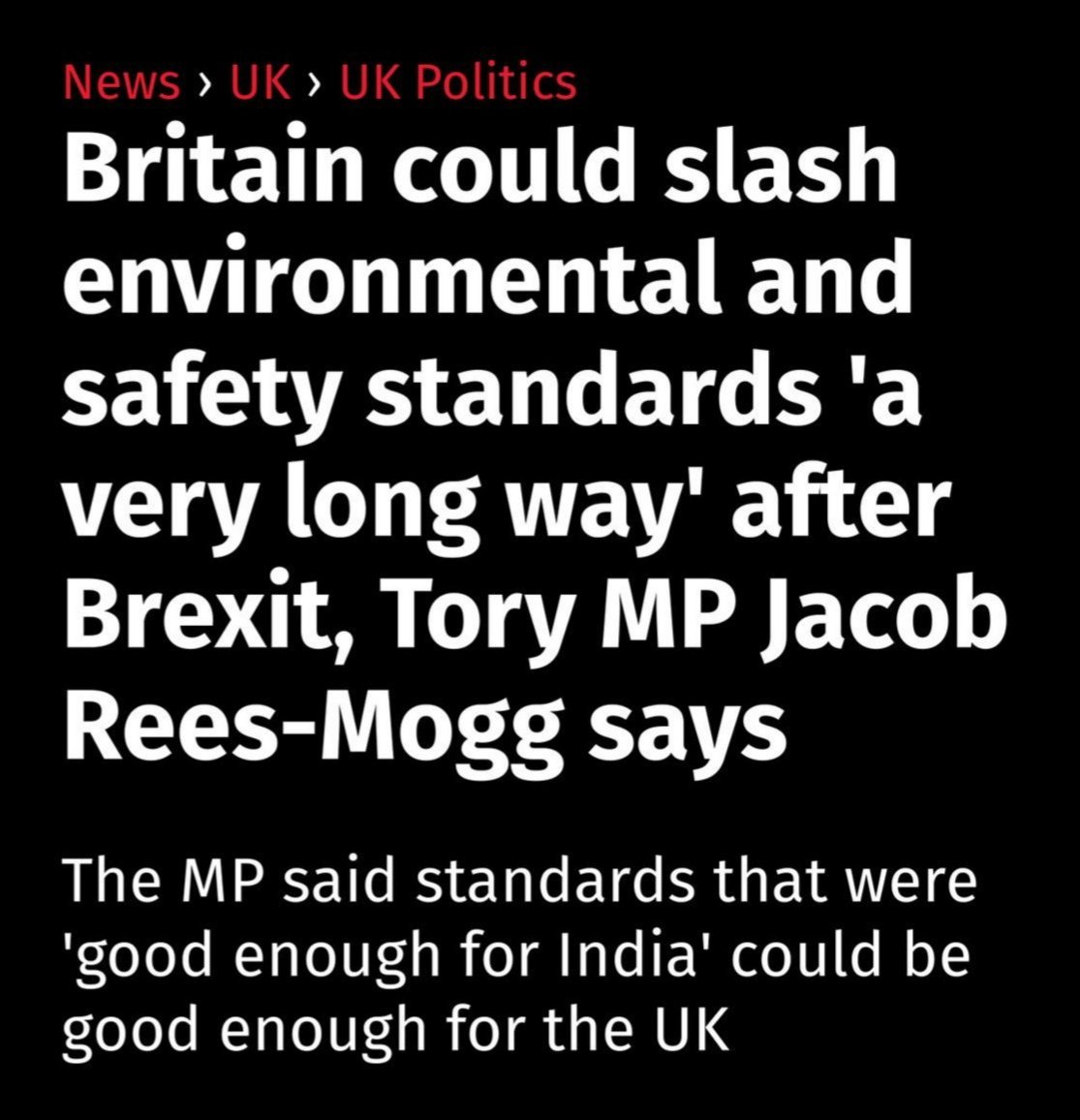

The ruling elite saw the corporate structure as an additional means of social control.
Members of the economic elite were often pampered by the political elite to ensure a continued mutuality of interests, especially in the repression of “have-not” citizens.



Members of the economic elite were often pampered by the political elite to ensure a continued mutuality of interests, especially in the repression of “have-not” citizens.



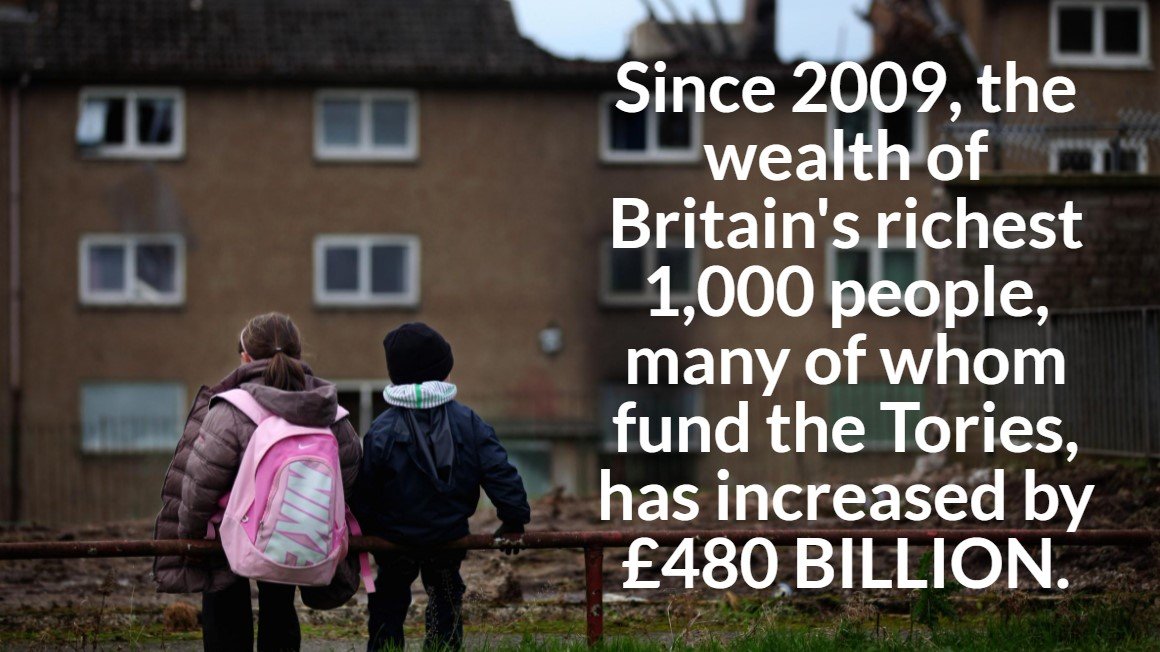
10 Power of labour suppressed.
Organised labour could challenge the political hegemony of the ruling elite & its corporate allies, so it was made powerless.
A poor underclass was viewed with suspicion or contempt. Under some regimes, being poor was considered akin to a vice.

Organised labour could challenge the political hegemony of the ruling elite & its corporate allies, so it was made powerless.
A poor underclass was viewed with suspicion or contempt. Under some regimes, being poor was considered akin to a vice.


11. Disdain and suppression of intellectuals & the arts.
Intellectuals & the inherent freedom of ideas & expression associated with them were anathema to these regimes. Intellectual and academic freedom were considered subversive to national security & the patriotic ideal.


Intellectuals & the inherent freedom of ideas & expression associated with them were anathema to these regimes. Intellectual and academic freedom were considered subversive to national security & the patriotic ideal.



Universities were tightly controlled; politically unreliable faculty harassed or eliminated. Unorthodox ideas or expressions of dissent were attacked, silenced, or crushed. To these regimes, art & literature should serve the national interest or they had no right to exist. 





12. Obsession with crime & punishment.
Most of these regimes maintained Draconian systems of criminal justice with huge prison populations.
The police were often glorified & had almost unchecked power, leading to rampant abuse.


Most of these regimes maintained Draconian systems of criminal justice with huge prison populations.
The police were often glorified & had almost unchecked power, leading to rampant abuse.



“Normal” and political crime were often merged into trumped-up criminal charges and sometimes used against political opponents of the regime.
Fear, and hatred, of criminals or “traitors” was often promoted among the population as an excuse for more police power.

Fear, and hatred, of criminals or “traitors” was often promoted among the population as an excuse for more police power.


13. Rampant cronyism & corruption.
Those in business circles & close to the power elite used their position to enrich themselves.
The power elite would receive financial gifts & property from the economic elite, who in turn would gain the benefit of govt favoritism.


Those in business circles & close to the power elite used their position to enrich themselves.
The power elite would receive financial gifts & property from the economic elite, who in turn would gain the benefit of govt favoritism.



Members of the power elite were in a position to obtain vast wealth from other sources as well.
With the national security apparatus under control & the media muzzled, this corruption was largely unconstrained & not well understood by the general population.
With the national security apparatus under control & the media muzzled, this corruption was largely unconstrained & not well understood by the general population.

14. Fraudulent elections.
Elections in the form of plebiscites or public opinion polls were usually bogus.
When actual elections with candidates were held, they would usually be perverted by the power elite to get the desired result.



Elections in the form of plebiscites or public opinion polls were usually bogus.
When actual elections with candidates were held, they would usually be perverted by the power elite to get the desired result.




Anyway, like I say, read widely, examine the evidence, & draw your own conclusions about the extent to which Boris Johnson's Government increasingly resembles a proto/neo-fascist state.
But remember, democracy is hard won, & fragile, & nobody took Hitler seriously to begin with.
But remember, democracy is hard won, & fragile, & nobody took Hitler seriously to begin with.

Let me make it clear that I'm fully aware of Godwin's law, & I'm NOT saying Boris Johnson is a genocidal dictator, or the UK Government is a fascist regime.
However, here's another #THREAD about uncanny parallels between our Govt, & the early Nazi Party:
However, here's another #THREAD about uncanny parallels between our Govt, & the early Nazi Party:
https://twitter.com/docrussjackson/status/1371265857108738048
• • •
Missing some Tweet in this thread? You can try to
force a refresh


